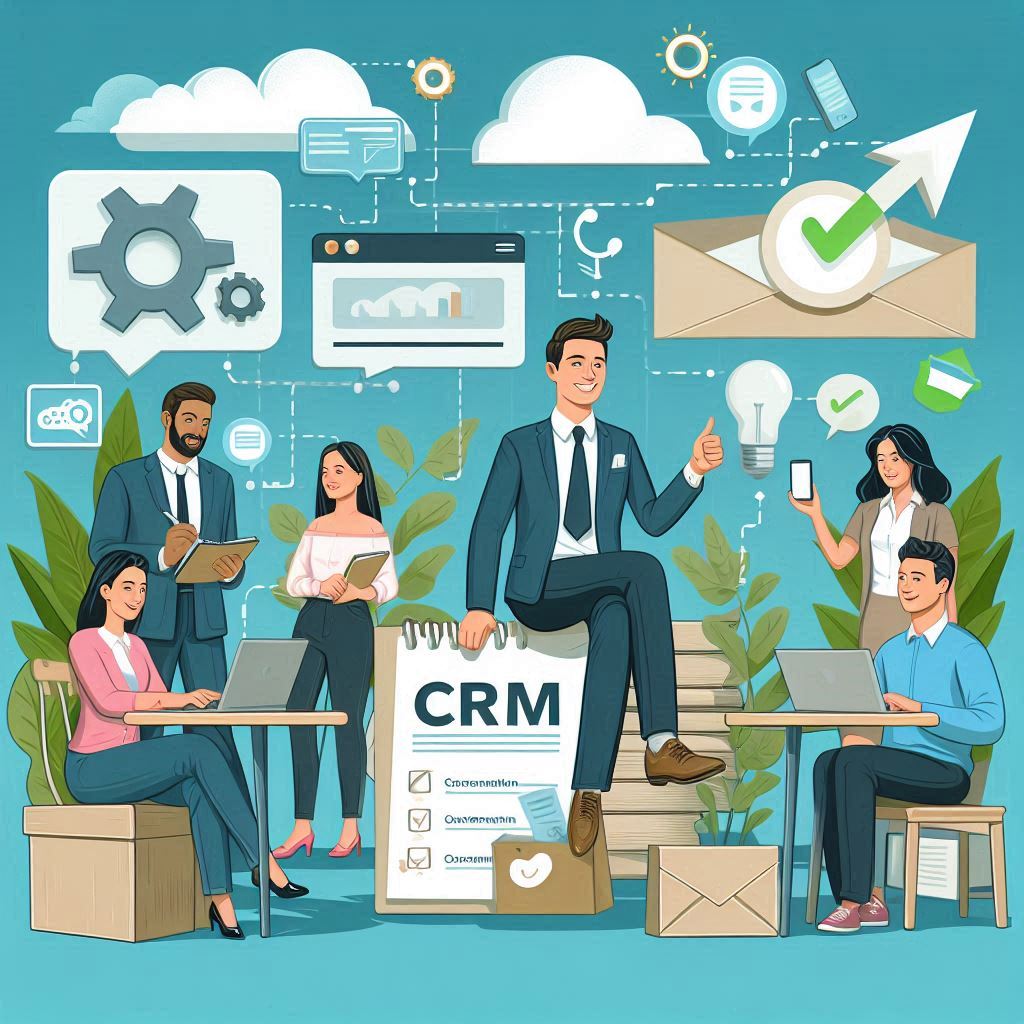
Customer Relationship Management (CRM) solutions are software tools that help businesses manage their interactions and relationships with current and potential customers. These solutions are designed to streamline and automate processes such as sales, marketing, and customer service, ultimately improving the overall customer experience. CRM solutions typically include features such as contact management, lead management, sales forecasting, and analytics. By centralizing customer data and providing insights into customer behavior, CRM solutions enable businesses to make more informed decisions and better serve their customers.
CRM solutions can be implemented across various industries, including retail, finance, healthcare, and more. They can be used by businesses of all sizes, from small startups to large enterprises. The primary goal of CRM solutions is to help businesses build and maintain strong relationships with their customers, ultimately leading to increased customer satisfaction, loyalty, and retention. With the rise of digital technology and the increasing importance of customer experience, CRM solutions have become an essential tool for businesses looking to stay competitive in today's market.
Benefits of Implementing CRM Solutions
Implementing CRM solutions offers a wide range of benefits for businesses. One of the key benefits is improved customer relationships. By centralizing customer data and providing a 360-degree view of each customer, businesses can better understand their needs and preferences, leading to more personalized interactions and improved customer satisfaction. CRM solutions also help businesses streamline their sales and marketing processes, leading to increased efficiency and productivity. By automating tasks such as lead management and email marketing, businesses can focus on building relationships with customers rather than getting bogged down in administrative tasks.
Another benefit of implementing CRM solutions is improved data management. With CRM solutions, businesses can capture and store valuable customer data in one centralized location, making it easier to access and analyze. This data can provide valuable insights into customer behavior and preferences, helping businesses make more informed decisions and tailor their offerings to better meet customer needs. Additionally, CRM solutions can help businesses track and measure the success of their sales and marketing efforts, providing valuable insights into what is working and what needs improvement. Overall, implementing CRM solutions can lead to increased revenue, improved customer satisfaction, and a more efficient and effective business operation.
Types of CRM Solutions
There are several types of CRM solutions available in the market, each designed to meet the specific needs of different businesses. One common type of CRM solution is operational CRM, which focuses on automating and improving customer-facing processes such as sales, marketing, and customer service. Operational CRM solutions typically include features such as contact management, lead management, and sales forecasting, helping businesses streamline their day-to-day operations and improve customer interactions.
Another type of CRM solution is analytical CRM, which focuses on analyzing customer data to gain insights into customer behavior and preferences. Analytical CRM solutions typically include features such as data mining, predictive analytics, and customer segmentation, helping businesses better understand their customers and make more informed decisions. By analyzing customer data, businesses can identify trends, predict future behavior, and tailor their offerings to better meet customer needs.
A third type of CRM solution is collaborative CRM, which focuses on improving communication and collaboration between different departments within a business. Collaborative CRM solutions typically include features such as document management, project management, and communication tools, helping businesses break down silos and work together more effectively to serve their customers. By improving internal communication and collaboration, businesses can provide a more seamless and consistent experience for their customers.
How to Choose the Right CRM Solution for Your Business
Choosing the right CRM solution for your business is a critical decision that requires careful consideration. When evaluating CRM solutions, it's important to first assess your business needs and goals. Consider what specific challenges you are looking to address with a CRM solution, whether it's improving sales efficiency, enhancing customer service, or gaining better insights into customer behavior. Understanding your specific needs will help you narrow down your options and find a solution that aligns with your business objectives.
It's also important to consider the scalability of the CRM solution. As your business grows, your CRM needs may change, so it's important to choose a solution that can grow with you. Look for a solution that offers flexibility and customization options to accommodate your changing needs over time. Additionally, consider the integration capabilities of the CRM solution. A good CRM solution should seamlessly integrate with your existing systems and tools, such as your email marketing platform or accounting software, to ensure a smooth and efficient operation.
Another important factor to consider when choosing a CRM solution is the user experience. The success of a CRM solution depends on how well it is adopted by your team members, so it's important to choose a solution that is intuitive and easy to use. Look for a solution that offers a clean and user-friendly interface, as well as comprehensive training and support resources to help your team get up to speed quickly. Finally, consider the cost of the CRM solution. While it's important to stay within budget, it's also important to consider the long-term value that a CRM solution can bring to your business. Look for a solution that offers a good balance of features and affordability to ensure you are getting the most value for your investment.
Implementing CRM Solutions in Your Organization
Implementing a CRM solution in your organization requires careful planning and execution to ensure a successful adoption. One of the first steps in implementing a CRM solution is to define clear goals and objectives for the implementation. Consider what specific outcomes you are looking to achieve with the CRM solution, whether it's improving sales performance, enhancing customer service, or gaining better insights into customer behavior. By clearly defining your goals, you can create a roadmap for implementation that aligns with your business objectives.
Another important step in implementing a CRM solution is to ensure buy-in from key stakeholders within your organization. Communicate the benefits of the CRM solution and how it will impact different departments within your organization. By involving key stakeholders early in the process and addressing any concerns or questions they may have, you can build support for the implementation and increase the likelihood of successful adoption.
Once you have buy-in from key stakeholders, it's important to carefully plan the implementation process. Consider how the CRM solution will integrate with your existing systems and processes, as well as how it will impact different departments within your organization. Develop a detailed implementation plan that outlines key milestones, timelines, and responsibilities to ensure a smooth and efficient rollout.
Finally, provide comprehensive training and support for your team members to ensure they are equipped to use the CRM solution effectively. Offer hands-on training sessions, as well as ongoing support resources such as user guides and helpdesk support to address any questions or issues that may arise during the implementation process.
Best Practices for Using CRM Solutions
Once you have implemented a CRM solution in your organization, it's important to establish best practices for using the system effectively. One best practice is to ensure that all relevant data is captured in the CRM system. Encourage your team members to consistently input customer interactions, sales activities, and other relevant data into the system to ensure that you have a comprehensive view of each customer.
Another best practice is to regularly review and analyze the data captured in the CRM system to gain insights into customer behavior and preferences. Use the analytics tools provided by the CRM solution to identify trends, predict future behavior, and tailor your offerings to better meet customer needs.
It's also important to establish clear processes for using the CRM system across different departments within your organization. Define standard operating procedures for tasks such as lead management, sales forecasting, and customer service interactions to ensure consistency and efficiency in how the system is used.
Finally, regularly review the performance of your CRM system to ensure that it is meeting your business objectives. Monitor key metrics such as customer satisfaction, sales performance, and efficiency in using the system to identify areas for improvement and make adjustments as needed.
Future Trends in CRM Solutions
Looking ahead, there are several emerging trends in CRM solutions that are shaping the future of customer relationship management. One trend is the increasing use of artificial intelligence (AI) in CRM solutions. AI-powered tools are being used to automate tasks such as lead scoring, predictive analytics, and chatbots for customer service interactions. By leveraging AI technology, businesses can gain deeper insights into customer behavior and automate routine tasks to improve efficiency.
Another trend in CRM solutions is the growing importance of omnichannel capabilities. With customers interacting with businesses across multiple channels such as email, social media, phone calls, and in-person interactions, it's important for businesses to have a seamless omnichannel experience. Modern CRM solutions are incorporating omnichannel capabilities to provide a unified view of each customer across different touchpoints, enabling businesses to deliver a more personalized and consistent experience.
Additionally, there is a growing focus on mobile capabilities in CRM solutions. With more employees working remotely or on-the-go, it's important for CRM solutions to offer mobile access so that team members can access customer data and perform tasks from anywhere. Mobile-friendly interfaces and apps are becoming increasingly important features in modern CRM solutions.
Overall, these emerging trends in CRM solutions are shaping the future of customer relationship management by providing businesses with advanced tools and capabilities to better understand their customers and deliver exceptional experiences.
In conclusion, implementing a CRM solution offers numerous benefits for businesses looking to improve their customer relationships and streamline their operations. By understanding the different types of CRM solutions available and carefully choosing the right solution for your business needs, you can set yourself up for success in implementing a CRM solution in your organization. By following best practices for using the system effectively and staying ahead of future trends in CRM solutions, you can ensure that your business remains competitive in today's market by delivering exceptional experiences for your customers.
